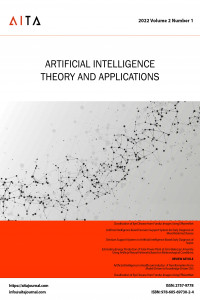Abstract
The exponential digitalization of products and services, as well as the changing facades of reality, provide a larger area for AI in everyday life. In response to Stiegler's criticisms of Goffman and Bernardini's approach to infantilization, AI appears in all contexts in the modern World surrounding us from simple home equipment to 3D printers, from smart buildings to precision agriculture. The automatized habits, full of lists of likes and dislikes created by opinion leaders, proclaimed future designers, or common post-world paradigms, arose from the pseudo-reality of post-traumatic human behaviors regarding consumerism society. On the one hand, real AI advancements grasp more value, space, and interest in real life, but they also flourish in cinema as a fantasy world. This paper aims to question how cinematic imagination intersects with reality in science fiction films, with an emphasis on AI representation in cinema films.
References
- [1] Becker, A. (2019). Artificial intelligence in medicine: What is it doing for us today?. Health Policy and Technology, 8(2), 198-205.
- [2] Başbuğ, Bengü (2018). When Brand Communication Becomes Childish. Infantilization in 21st Century Advertising, Munich, GRIN Verlag, https://www.grin.com/document/465677
- [3] Dorfman, A. (1987:177). The infantilizing of culture. In Lazere, D. (Ed.), American Media and Mass Culture: Left Perspectives (pp. 145-157). Berkeley, CA: University of California.
- [4] Danesi, Marcel (2003) Forever Young: The ‘Teen-Aging’ of Modern Culture. Toronto: Toronto University Press.
- [5] Barber, B. R. (2008). Consumed: How markets corrupt children, infantilize adults, and swallow citizens whole. WW Norton & Company.
- [6] Ansen, David (1986). “Tall Tale: Lord of the Mosquitoes.” (Mosquito Coast) Newsweek 106 (Dec 1).
- [7] Bora, R. (1998). From gold to green: shiny new currencies of latin american fetishism. Dispositio, 23(50), 37-58.
- [8] Wieseltier, L. (1994) ‘Close Encounters of the Nazi Kind’, New Republic, 210(4), 42-42.
- [9] Dowd, M. (1997). Leave It To Hollywood, The New York Times, Opinion, Liberties, August 16, 1997. https://www.nytimes.com/1997/08/16/opinion/leave-it-to-hollywood.html
- [10] Başbuğ, Bengü (2018). When Brand Communication Becomes Childish. Infantilization in 21st Century Advertising, Munich, GRIN Verlag, https://www.grin.com/document/465677
- [11] Safire, W. (2000). " Besotted With Potter. Wall Street Journal, 7, 11-2000.
- [12] https://allyjgardner.wordpress.com/2011/05/23/criticisms-grr/
- [13] Knapp, Krystal (June 3, 2019), George Will to Princeton graduates: The antidote to the overabundance of anger in America is praise, Planet Princeton, https://planetprinceton.com/2019/06/03/george-will-toprinceton-graduates-the-antidote-to-the-overabundance-of-anger-in-america-is-praise/
- [14] Grebey, J. (Jul 15, 2016). Comic Books are selling better than they have in 20 years — here's why they're so popular. Insider. https://www.insider.com/comic-books-are-popular-again-heres-why-2016-7
- [15] Aslantürk, Gülten (2021) Yaşlanma Sürecinin Biyopolitikası Alternatif Medya ve Ana Akım Medyada Yaşlanma Temsilleri, Nobel
- [16] Ginsberg, S. (2011). An American Reflection: Steven Spielberg, The Jewish Holocaust and the IsraeliPalestinian Conflict. 미국학, 34.
- [17] Urquhart, Conal (December 19, 2005). "Sharon's aide helps Spielberg promote controversial film". The Guardian. London. Retrieved May 13, 2010.
- [18] Vandemeulebroucke, T., Dierckx de Casterlé, B., & Gastmans, C. (2018). The use of care robots in aged care: A systematic review of argument-based ethics literature. Archives of Gerontology and Geriatrics Supplement, 74, 15–25. [19] Ulukan, G. (March 18, 2019) Yapay Zeka Teknolojisini Konu Edinen 10 Film, Webrazzi, https://webrazzi.com/2019/03/18/yapay-zeka-teknolojisini-konu-edinen-10-film/
- [20] Zengin, F. (2020) Akıllı Makine Çağı Sinemasına Giriş: Sinema Sanatında Yapay Zekâ Teknolojilerinin Kullanımı. İletişim Çalışmaları Dergisi, 6(2), 151-177.
- [21] Yılmaz, M., & Turan, N. S. (2018). Zekâ Yapay Ama Aşk Doğal: Bilim Kurgu Sinemasında Yapay Zekâ-İnsan Aşkının Temsili. Akdeniz Üniversitesi İletişim Fakültesi Dergisi, (30), 281-300.
- [22] Grabe, W., & Stoller, F. L. (1997). Content-based instruction: Research foundations. The content-based classroom: Perspectives on integrating language and content, 5-21.
- [23] Bell, D. (1973) The Coming of Post-Industrial Society, New York, Basic Books
- [24] Anders, Günther (2018) İnsanın Eskimişliği, İstanbul, İthaki
- [25] Bernardini, J. (2014). The infantilization of the postmodern adult and the figure of kidult. Postmodern Openings, 5(2), 39-55.
- [26] Postman, N. (1985). The disappearance of childhood. Childhood Education, 61(4), 286-293.
- [27] Harding, A. (2015). Beyond (dis) embodiment: Bernard Stiegler, Digital-Being & the Exteriorisation of Desire.
- [28] Goffman, E. (1959) The Presentation Of Self In Everyday Life. London: Penguin.
- [29] Hayward, Keith (2012) ‘Pantomime Justice: A Cultural Criminological Analysis of “Life Stage Dissolution”’, Crime Media Culture 8(2): 213–29.
- [30] Lévi-Strauss, C. (1967). The story of Asdiwal. The structural study of myth and totemism, 4, 1-47.
Details
| Primary Language | English |
|---|---|
| Journal Section | Research Articles |
| Authors | |
| Publication Date | April 30, 2022 |
| Published in Issue | Year 2022 Volume: 2 Issue: 1 |


